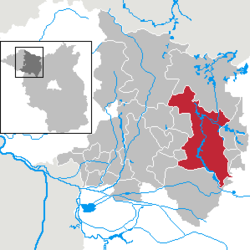Alt Ruppin
| Neuruppin | ||
|---|---|---|

Street with Holy Trinity Church
|
||
|
||
| Coordinates: 52°55′59″N 12°48′00″E / 52.93306°N 12.80000°ECoordinates: 52°55′59″N 12°48′00″E / 52.93306°N 12.80000°E | ||
| Country | Germany | |
| State | Brandenburg | |
| District | Ostprignitz-Ruppin | |
| Government | ||
| • Mayor | Jens-Peter Golde (Pro Ruppin) | |
| Area | ||
| • Total | 303.32 km2 (117.11 sq mi) | |
| Elevation | 44 m (144 ft) | |
| Population (2016-12-31) | ||
| • Total | 31,037 | |
| • Density | 100/km2 (270/sq mi) | |
| Time zone | CET/CEST (UTC+1/+2) | |
| Postal codes | 16816, 16818, 16827 | |
| Dialling codes | 03391, 033925, 033929, 033932, 033933 | |
| Vehicle registration | OPR, KY, NP, WK | |
| Website | www.neuruppin.de | |
Neuruppin (German pronunciation: [nɔʏʁʊˈpiːn]) is a town in Brandenburg, Germany, the administrative seat of Ostprignitz-Ruppin district. It is the birthplace of the novelist Theodor Fontane (1819–1898) and therefore also referred to as Fontanestadt. A garrison town since 1688 and largely rebuilt in a Neoclassical style after a devastating fire in 1787, Neuruppin has the reputation of being "the most Prussian of all Prussian towns".
The town is located on the shore of the Ruppiner See, a lake traversed by the Rhin river, about 60 km (37 mi) northwest of Berlin. In the north, the hilly landscape of Ruppin Switzerland stretches up to the Rheinsberg Lake Region and the border with Mecklenburg-Vorpommern. It is part of the Stechlin-Ruppiner Land Nature Park.
After several incorporations in 1993, Neuruppin today is one of Germany's largest municipalities by area.
The shores of Ruppiner See were settled since the Stone Age; in the 9th century AD, Poggenwerder Island was the site of a Slavic gord (burgwall), probably built by Polabian Zamizi tribes. The castle was possibly slighted during the Wendish Crusade of 1147 and about 1200 a lowland castle was erected on an opposite peninsula, which from 1214 served as the residence of the Lords of Ruppin. Their lordship remained an immediate Imperial estate until its final incorporation into the neighbouring Margraviate of Brandenburg in 1524.
...
Wikipedia



